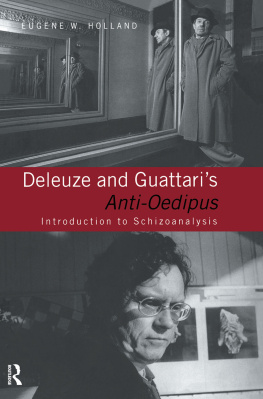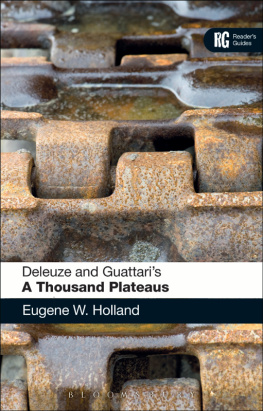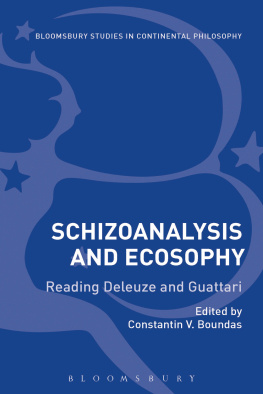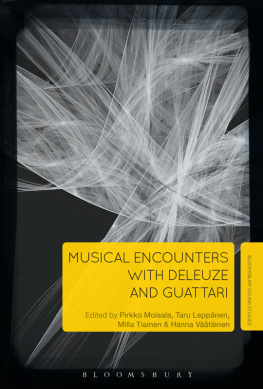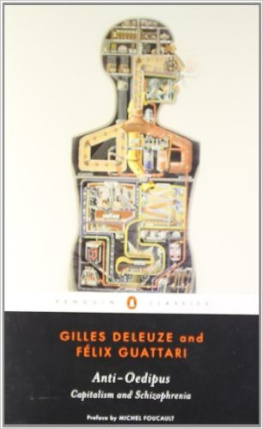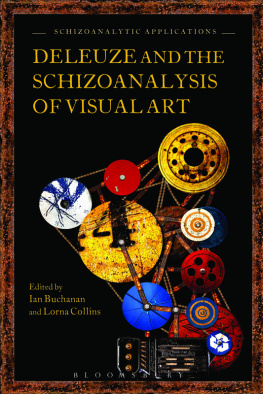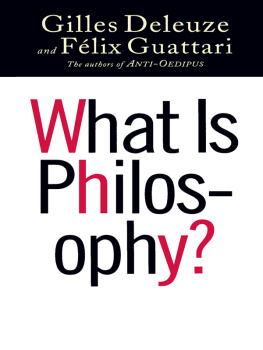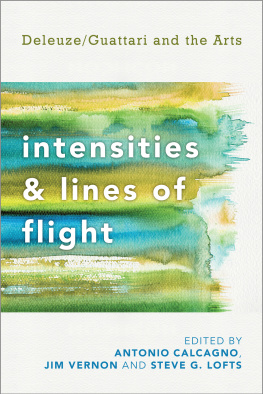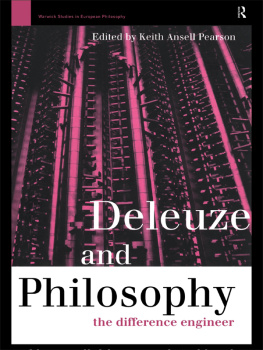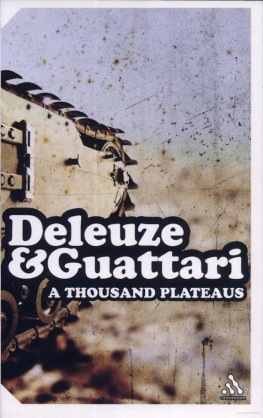
DELEUZE AND GUATTARIS ANTI-OEDIPUS
Anti-Oedipus is one of the most important texts in philosophy to have appeared in the last thirty years. The first collaborative work of Gilles Deleuze and Flix Guattari, it presents a brilliant and devastating critique of the Freudian Oedipus complex by condemning it as a reactionary, guilt-inducing product of capitalist institutions. A truly remarkable and vastly complicated text, Anti-Oedipus revolutionized poststructuralism and Continental philosophy.
In Deleuze and Guattaris Anti-Oedipus: Introduction to schizoanalysis Eugene W. Holland provides a comprehensive yet accessible guide to this complex and notoriously difficult text. He investigates the manner in which Deleuze and Guattari negotiate the interactions between the three main materialist thinkers of modernity, Freud, Marx, and Nietzche, and lucidly examines the role of schizoanalysis in Deleuze and Guattaris radical materialist psychiatry.
An indispensable guide to Anti-Oedipus, this book is a perfect introduction to the early thought of Deleuze and Guattari, celebrating not only the importance and rigor of their work but highlighting its lasting implications for the continuing debates on Marxism, environmentalism and feminism.
Eugene W. Holland is Associate Professor of French and Comparative Literature at the Ohio State University.
DELEUZE AND GUATTARIS ANTI-OEDIPUS
Introduction to schizoanalysis
Eugene W. Holland

First published 1999
by Routledge
Published 2014 by Routledge
2 Park Square, Milton Park, Abingdon, Oxon OX14 4RN
Simultaneously published in the USA and Canada by Routledge
711 Third Avenue, New York, NY, 10017, USA
Routledge is an imprint of the Taylor & Francis Group, an informa business
1999 Eugene W. Holland
Typeset in Times by Routledge
All rights reserved. No part of this book may be reprinted or reproduced or utilized in any form or by any electronic, mechanical, or other means, now known or hereafter invented, including photocopying and recording, or in any information storage or retrieval system, without permission in writing from the publishers.
British Library Cataloguing in Publication Data
A catalogue record for this book is available from the British Library
Library of Congress Cataloging in Publication Data
Holland, Eugene W.
Deleuze and Guattaris Anti-Oedipus : introduction to schizoanalysis / Eugene W. Holland
p. cm.
Includes bibliographical references and index
1. Social psychiatry. 2. PsychoanalysisSocial aspects. 3. Oedipus complexSocial aspects. 4. Capitalism. 5. SchizophreniaSocial aspects. I. Guattari, Flix. II. Holland, Eugene W. III. Title.
RC455.D42213
194dc21
1999
CIP
ISBN 13: 978-0-415-11318-2 (hbk)
ISBN 13: 978-0-415-11319-9 (pbk)
CONTENTS
This book is intended as an introduction to reading Deleuze and Guattaris Anti-Oedipus, not as a substitute for it. If this introduction encourages people to read or re-read the original, its aim will have been fulfilled; anyone who reads this book will be well prepared to read and enjoy Anti-Oedipus itself. Anyone who reads this book instead of the original, however, will be making a sorry mistake, for they will miss the chance to encounter first-hand one of the most fascinating and compelling experiments in recent French thought, an experiment that Deleuze and Guattari called schizoanalysis.
The experiment is both intricate and far-reaching, and the resulting book is quite difficult albeit for specific reasons that I will explain in what follows. Indeed, those well-versed in Deleuze and Guattaris works appear to have had as much difficulty with it as have those for whom Anti-Oedipus represents the initial encounter with Deleuze and Guattari: despite the titles notoriety, little sustained scholarly attention has been focused on the book in its own right. Experienced readers of Deleuze and Guattari may stand to benefit as much as do neophytes, then, from an introduction to schizoanalysis.
Anti-Oedipus is the first-fruit of a remarkable (and long-lasting) collaboration between philosopher Gilles Deleuze and anti-psychiatrist Flix Guattari. Guattari can be considered the rough equivalent in France of R. D. Laing or David Cooper in England, Thomas Szaz or Ernest Becker in the United States except that Guattari, in addition to being a leading theoretician of the innovative La Borde psychiatric clinic, was also a militant political activist who always sought to link his (anti-)psychiatric reforms and theorization to working-class and community-based revolutionary politics. Gilles Deleuze, meanwhile, was an apparently quite strictly academic philosopher, best-known initially for studies of the Western traditions maverick philosophers (such as Bergson and Spinoza, with Kant being the important exception), until his major contributions to French poststructuralism and its philosophies of difference appeared in the late 1960s. Indeed, it may be that the events of 1968 brought these two otherwise quite unlikely collaborators together in a way that would be unthinkable outside the context of that tumultuous and fertile moment, and that their thought-experiment was conducted in an effort to respond to it. But the fruit of that collaboration is, in any case, quite unlike either the Anglo-American anti-psychiatry, to which Guattaris work bears certain affinities, or the Frankfurt Schools synthesis of Marx and Freud (particularly the negative dialectics of Theodor Adorno), to which Deleuzes poststructuralist philosophy of difference could usefully be compared. Without attempting the impossible (and in any case pointless) task of trying to determine exactly what in Anti-Oedipus comes from the one and what from the other, it could be said that while Deleuze dramatically deepens Guattaris anti-psychiatric stance by grounding it in an alternative philosophical tradition featuring Nietzsche, Spinoza, and Bergson rather than Plato, Descartes, and Hegel, Guattari at the same time dramatically sharpens Deleuzes philosophical perspective by bringing it into contact with theoretical and institutional struggles in French psychoanalysis and psychiatry, and with the political turmoil surrounding students and workers movements in France and throughout Europe (particularly Italy). As much because of the moment in which it emerged as because of the quite disparate figures that were its authors, schizoanalysis is, to say the least, a quite extraordinary venture in experimental thinking and writing.
My first book Baudelaire and Schizoanalysis aimed to show what schizoanalysis can contribute to the field of literary and cultural history. It combined intensive reading of Baudelaires poetic texts and essays with extensive socio-historical contextualization of the emergence of modernism in mid-nineteenth-century France. The present book, in some ways a sequel to the first, is both less ambitious and more so: it is not as specialized and detailed, but at the same time it aims to be both comprehensive and accessible in its presentation of schizoanalysis. Comprehensive yet accessible: that is no easily accomplished task. For Anti-Oedipus is an extremely complicated work that draws on a prodigious range of sources, not all of which can be treated adequately in a book of this scope. Indeed, to follow up all or even most of Deleuze and Guattaris references to art and literature, anthropology and ethnography, economics, psychology, physics, aesthetics, biology, philosophy, mathematics, and so on, would require a book several times the size of
Next page
